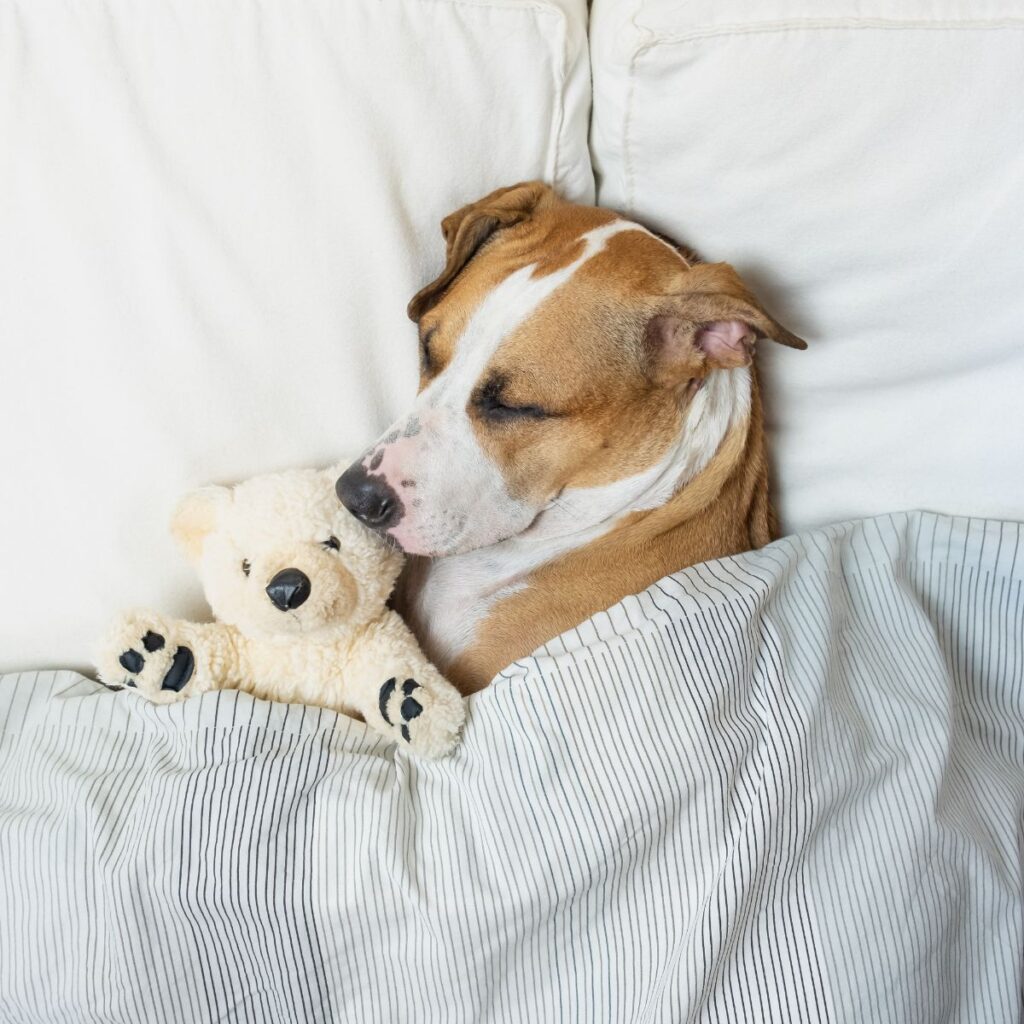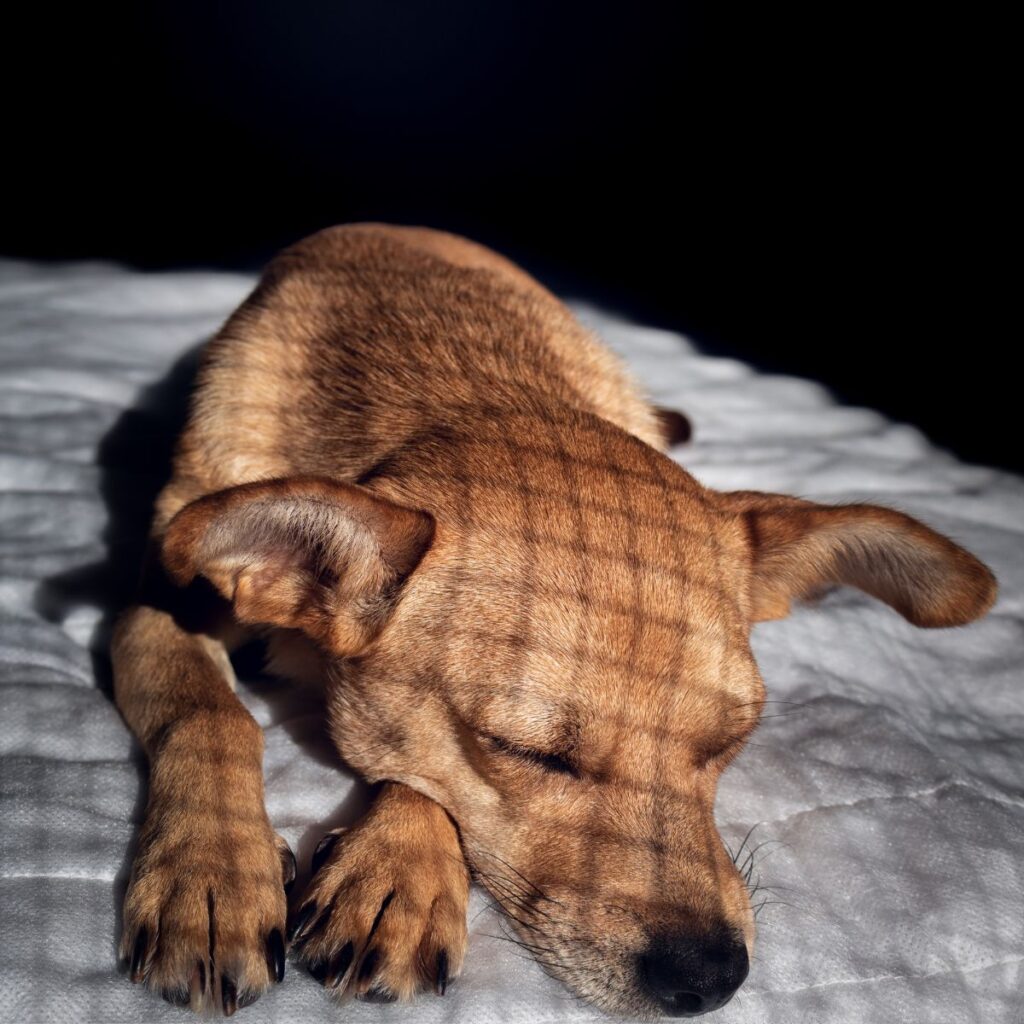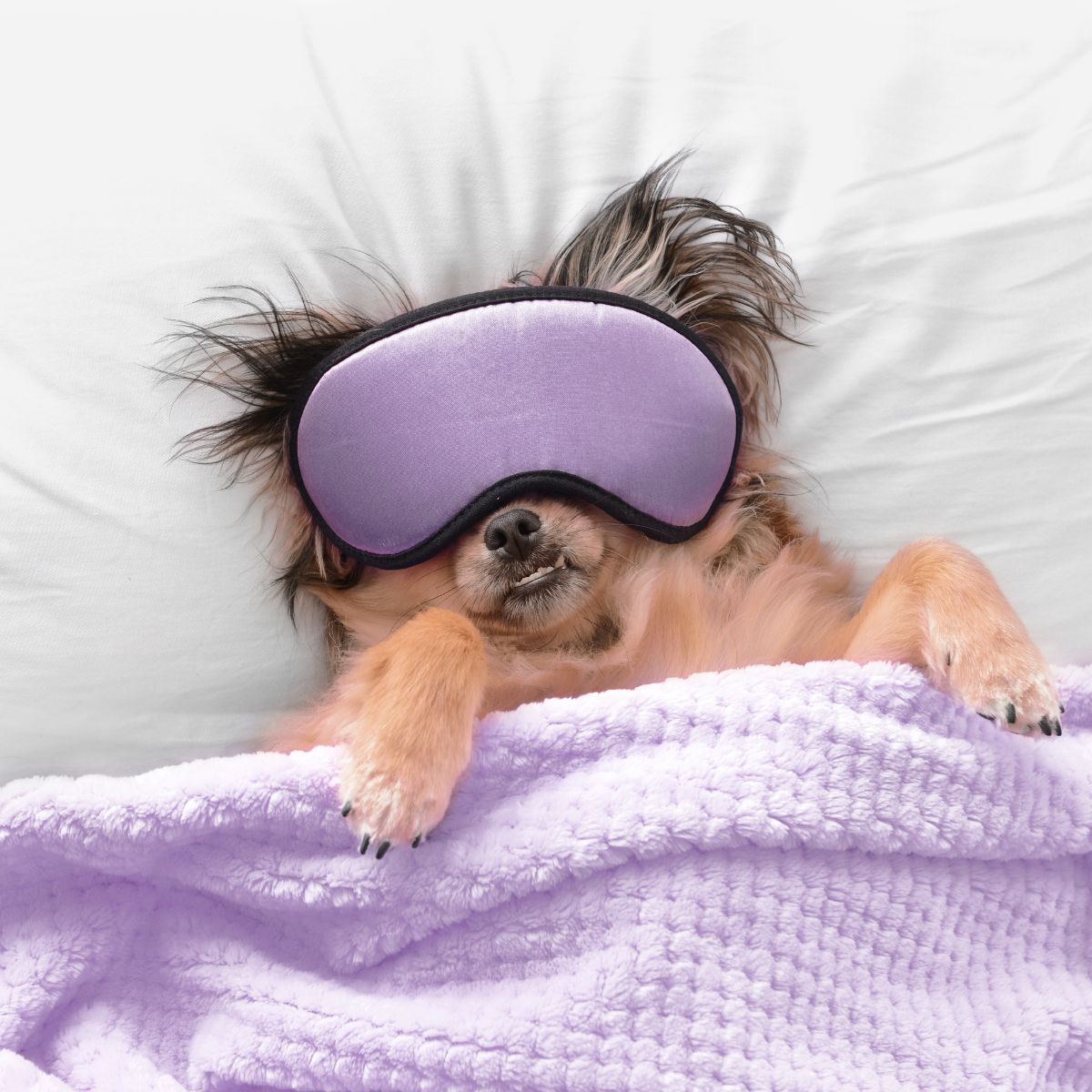Do dogs like sleeping in the dark? Wondering about your furry friend’s bedtime preferences is normal.
Dogs, unlike humans, may not see light the same way, but they have their own sleep habits. Some dogs enjoy a darker sleeping spot because it makes them feel safe and cozy.
Others might not mind a bit of light. Let’s learn whether darkness matters to your dog when it’s time for a good night’s sleep.
Do Dogs Like Dark Places To Sleep?

Have you ever thought about whether dogs like sleeping in the dark? Knowing your furry friend’s preference is critical to making a cozy sleeping spot. Dogs, each with their personality, have different likes regarding where they sleep.
Lots of dogs like darker spots for their nap or bedtime. It could be because the animals feel safe and comfy in a dim or dark place.
But remember, every dog is different. Some might feel just as happy in bright areas, mainly if they’re used to it.
Watch your dog and see where they like to rest. If they often choose darker corners, it might mean they want a quieter, darker spot.
Giving choices at home, like comfy beds in bright and dim spots, lets your dog pick what they like. It helps them feel safe and cozy, making their sleep better.
In the end, many dogs might like dark places, but respecting your dog’s unique choices ensures they’re happy and comfy when it’s time to rest.
Do Dogs Care If You Leave Light On At Night?

They wonder if dogs care if you leave a light on at night. Understanding your furry friend’s preferences can significantly impact their well-being and comfort during nighttime.
As creatures of habit, dogs may respond differently to varying light levels in their sleeping environment.
Some dogs find comfort and reassurance in a dimly lit room, as it helps them navigate and feel more secure.
Leaving a gentle light on may be particularly beneficial for dogs prone to anxiety or those adjusting to new surroundings.
However, not all dogs share the same preferences. Many canines are adaptable to low-light conditions and may not necessarily care if the lights are on or off at night.
Dogs possess excellent night vision and can often maneuver effectively in darker environments.
To decipher your dog’s preference, observe their behavior. If they appear relaxed and sleep well in the dark, leaving a light on may not be a significant concern for them.
Ultimately, tailoring the sleeping environment to your dog’s needs is critical. Experiment with different lighting options, paying attention to your dog’s reactions, to create a nighttime setting that promotes their overall well-being.
While some dogs may appreciate the extra glow, others may not care as much, and your observations will guide you in making the best choice for your canine companion.
Why Some Dogs Hate Sleeping In the Dark?

Understanding why some dogs dislike sleeping in the dark can shed light on their behaviors and help create a more comfortable sleeping environment. While each dog is unique, certain factors contribute to this aversion to darkness.
- Anxiety Issues: Dogs prone to anxiety may feel more comfortable with some ambient light. Darkness can amplify feelings of uncertainty, triggering concern in some dogs. Providing a soft light source can offer reassurance and a sense of security.
- New Environments: Dogs adjusting to a new home may find darkness unsettling. The unfamiliar surroundings can be overwhelming, and leaving a light on initially may aid in their acclimation process.
- Past Traumas: Dogs with a history of trauma or negative experiences in the dark may develop an aversion. It’s crucial to be mindful of a dog’s past and work to create a positive association with darkness over time.
- Age-Related Changes: Older dogs may experience vision changes or develop night blindness, making it challenging for them to navigate in the dark. In such cases, providing a well-lit environment can enhance their comfort.
To address this aversion, consider gradually introducing your dog to darkness, offering positive reinforcement, and observing their behavior.
Experiment with different lighting options to find what suits your dog best, ensuring a peaceful and stress-free sleeping experience.
How to Help Your Dog Feel Safe in the Dark
Ensuring your dog feels safe in the dark is essential for their well-being and a good night’s rest. Here are practical steps to help your canine companion feel secure during nighttime hours:
1: Soft Lighting: Provide a gentle light source in your dog’s sleeping area. It could be a nightlight or a small lamp with a low-wattage bulb. The soft glow can offer reassurance and make the space more inviting.
2: Comfortable Sleeping Space: Create a cozy and comfortable bed for your dog. Include familiar items, such as their favorite blanket or toy, to establish a sense of familiarity and security.
3: Positive Associations: Associate the dark with positive experiences. Use treats, toys, or gentle praise when your dog is in the night, gradually creating a positive connection with nighttime.
4: Gradual Acclimation: If your dog is uncomfortable with darkness, gradually acclimate them by dimming the lights over several nights. This gradual transition allows your dog to adjust without feeling overwhelmed.
5: Calm Bedtime Routine: Establish a clear and consistent bedtime routine. Dogs thrive on performance, and a predictable nighttime routine can help them feel more at ease in the dark.
6: Comforting Sounds: Consider playing soft, calming music or white noise in the background. These soothing sounds can provide a sense of security and drown out any potentially disturbing noises.
7: Seek Professional Guidance: If your dog’s fear of the dark persists, consult with a veterinarian or a professional dog behaviorist. They can provide personalized advice and strategies to address your dog’s specific needs.
By implementing these strategies, you can help your dog feel safe and secure in the dark, fostering a positive association with nighttime and promoting restful sleep for both you and your furry friend.
Where Should A Dog Sleep At Night?
A dog should sleep indoors at night in a comfortable and safe space. It’s best to provide a designated area in a quiet part of the house, like a cozy bed or crate.
It helps ensure the dog feels secure and part of the family. Avoid leaving them outside overnight, as it can expose them to potential dangers and discomfort.
Consider your dog’s comfort and safety when choosing their nighttime sleeping spot.
Do Dogs Need Silence To Sleep?
Dogs don’t necessarily need complete silence to sleep, but they prefer a calm and quiet environment. Loud noises or disturbances might disturb their rest.
It’s beneficial to provide a peaceful space, away from excessive noise, to help them relax and enjoy a good night’s sleep.
While some dogs can adapt to background sounds, a generally quiet area promotes better sleep for most dogs.
Consider their comfort and create a serene sleeping environment for your furry friend.
Do puppies prefer sleeping in the dark?
A: Puppies often find comfort in sleeping in the dark, mimicking their experiences in the mother’s womb.
FAQS
1: Can exposure to natural light during the day affect a dog’s nighttime sleep preference?
A: Yes, exposure to natural light during the day can help regulate a dog’s sleep-wake cycle, influencing their preference for a darker sleep environment at night.
2: Are there breeds that are more sensitive to sleeping conditions?
A: Some breeds may be more sensitive to sleeping conditions; for example, species with heightened senses, like sighthounds, might prefer darker environments.
3: Can age influence changes in sleeping habits?
A: Yes, as dog’s age, their sleeping preferences may change. Older dogs may appreciate a darker, quieter environment for better rest
4: Are dogs bored if they sleep a lot?
A: Not necessarily. Dogs sleep often, especially during life stages like puppyhood and old age.
While excessive sleeping can sometimes indicate health issues, it’s natural for dogs to spend a significant portion of their day sleeping.
Dogs also sleep to conserve energy, recover from activities, and aid growth and development.
Conclusion
In conclusion, the preference of dog for sleeping in the dark is a common trait among dogs, aligning with their instincts and contributing to better sleep quality.
While individual preferences may vary, providing a quiet, dark sleeping environment can enhance a dog’s rest and well-being.
Responsible pet owners contribute to a harmonious and comfortable living environment for dogs and their human companions by understanding and catering to their furry companions’ preferences.
Observing their behaviors and adapting sleeping spaces accordingly can foster a positive and restful experience for our canine friends, promoting their overall health and happiness.
